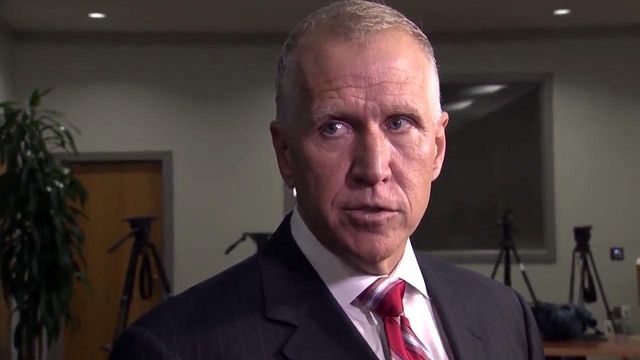Tillis may have benefited from Facebook data breach
The data firm accused of stealing the private information of more than 50 million Facebook users may have used that information to help U.S. Sen. Thom Tillis win his seat in 2014.
Posted — UpdatedNorth Carolina voters were among the first in the U.S. to be targeted by Cambridge Analytica, which boasted that its cache of "psychographic data" could be used to build personality profiles of voters and target political ads at them to influence their behavior.
Much of that data appears to have come from Facebook profiles.
One of the founders of Cambridge Analytica said the firm bought Facebook data, starting in 2014, from a Russia-linked researcher who claimed he was gathering it for academic study. It was gathered using a Facebook personality quiz that also took personal data from a user's friends without their knowledge.
Roughly 270,000 people downloaded and shared personal details with the app.
Facebook reportedly learned of the data breach more than two years ago but did not tell users. Instead, the social media giant told Cambridge Analytica to delete the unauthorized data. The firm claimed it did, but copies of the database still exist.
In 2014, Tillis' campaign paid Cambridge Analytica $30,000, and the North Carolina Republican Party paid $150,000, making the GOP the company's fourth-largest client that year. The party also paid the firm $65,000 in 2015.
"CA Political was contracted to provide modeled data and data analysis on partisanship, turnout, issue importance and personality profile for North Carolina GOP in the race between Republican Thom Tillis and Democrat Kay Hagan," the case study states. "Harnessing our unique data-rich voter file, we were able to accurately predict partisanship, turnout, issue importance and build psychographic profiles for all voters in North Carolina. We produced clusters of voters based on the modeled data to maximize campaign impact, which enabled the creation of tailored messages directed at those audiences."
Those messages went out, according to the case study, in the form of direct mail and get-out-the-vote calls to more than 128,000 voters, increasing turnout by more than 12 percent.
Tillis defeated Hagan by fewer than 50,000 votes following a campaign marked by one negative ad after another on both sides.
Cambridge Analytica's third-largest client in 2014, the John Bolton SuperPAC, was also highly active in the Tillis/Hagan race, spending nearly $1.5 million to benefit Tillis and damage Hagan. The super-PAC spent $341,000 with the company for messaging consulting.
Tillis didn't respond Monday to repeated requests for comment on the allegations against Cambridge Analytica’s methods. Republican 10th District Congressman Patrick McHenry, whose campaign also spent $15,000 on Cambridge Analytica’s services in 2014, also didn't respond to requests for comment.
Dallas Woodhouse, executive director of the state Republican Party, said the party uses the Republican National Committee for voter data and never used Cambridge Analytica for that purpose.
"The vendor in question was one of several contracted to do work on the party's direct mail program. The company was not hired and did not do social media work for the party," Woodhouse, who didn't work for the GOP in 2014, said in an email. "They have not been engaged in nearly four years, and there are no plans to use the company in the future. Any vendor that operated in less than a transparently ethical manner is forbidden from future work."
Still, North Carolina Democratic Party Chairman Wayne Goodwin said the new revelations raise a lot of questions about what the GOP, Tillis or McHenry knew about Cambridge Analytica, what they asked the firm to do and when they found out about its connections to Russia.
"I don't know if it had any direct impact but it certainly was a trial run for what happened in 2016 here in the elections across our country," Goodwin said. "I would never have thought that North Carolina would have been the guinea pig for this type of activity."
President Donald Trump used Cambridge Analytica in his general election campaign in 2016.
The company is backed by the family of billionaire donor Robert Mercer, a hedge fund manager who also supported the Trump campaign and other conservative candidates and causes, including former Trump strategist Steve Bannon. Trump campaign officials have downplayed Cambridge Analytica's role, saying they briefly used the company for television advertising and paid some of its most skilled data employees.
Goodwin said many questions need to be answered to safeguard the integrity of elections in the social media age.
"We can't control or know the algorithms of what data, what ads, what information – fake news, real news – we don't know what all is sent our way," he said. "If you're bombarded with this stuff by someone who's weaponizing data tuned in just to what your trigger points are, no telling what the outcome could be at election time."
Cambridge Analytica did not respond to WRAL News' request for comment.
Related Topics
• Credits
Copyright 2024 by WRAL.com and the Associated Press. All rights reserved. This material may not be published, broadcast, rewritten or redistributed.





